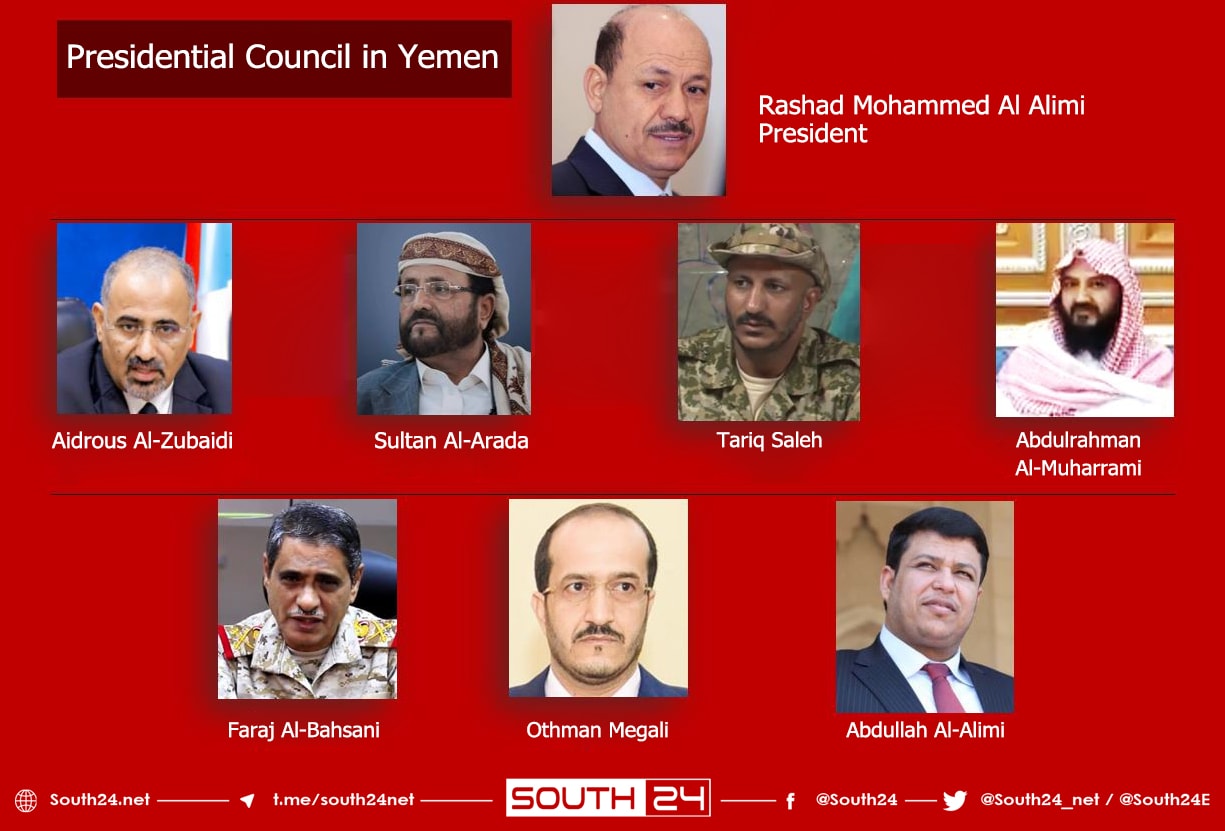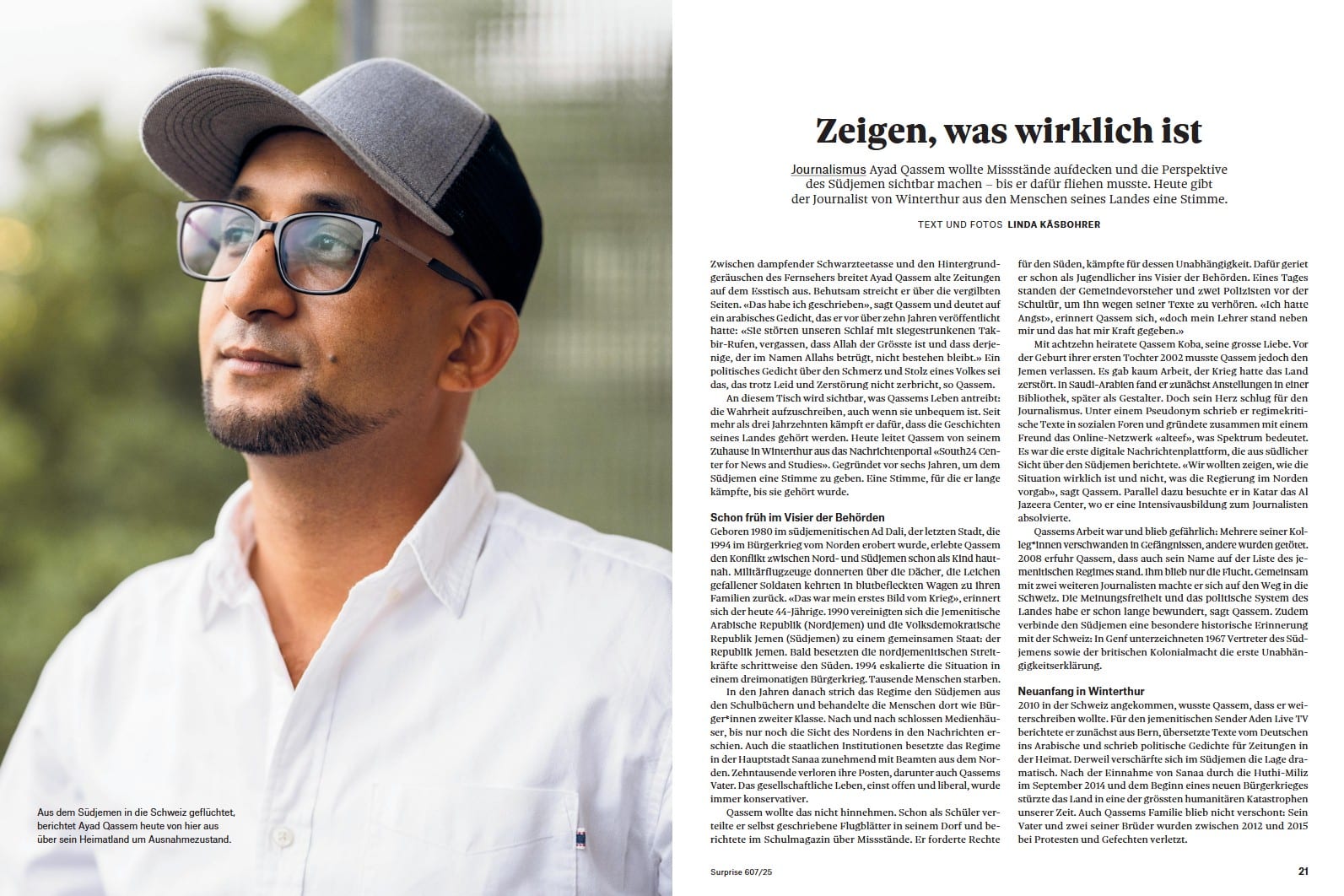
آخر تحديث في: 07-04-2022 الساعة 3 مساءً بتوقيت عدن
Riyadh (South24)
Yemen's President Abdrabbuh Mansur Hadi announced early today the transfer of his full constitutional powers to an eight-person Presidential Leadership Council.
The presidential announcement came immediately after an executive decision to relieve the pro-Islamists Yemeni vice president General Ali Mohsen Al-Ahmar from his position.
The announcement came as a result of the Yemeni-Yemeni consultations that have been taking place in Riyadh since September 29, and are expected to conclude on today.
The Kingdom of Saudi Arabia welcomed the formation of the Presidential Council in Yemen, announcing the provision of $3 billion in support to the Yemeni economy, including $2 billion to support the Central Bank of Yemen equally with the UAE, and one billion as additional support for oil derivatives grant and development projects.
According to the power transfer announcement, Hadi announced the formation of a "Presidential Council" to complete the implementation of the tasks for the transitional period. Hadi said, "I hereby irrevocably delegate my full powers to the Presidential Council, in accordance with the constitution, the Gulf initiative and its executive mechanism."
According to the announcement, the Presidential Council, in addition to its above-mentioned powers, has all the powers of the Vice President.
Hadi Rashad Mohammad Al-Alimi was named Chairman of the Presidential Council, while Sultan Ali Al-Arada, Tariq Mohammad Saleh, Abdulrahman Al-Muharrami, Abdullah Al-Alimi Bawazeer, Othman Hussein Megali, Aidrous Qassem Al-Zubaidi and Faraj Salmin Al-Bahsani” were named members of the Council. According to the announcement, each member of the Presidential Council shall have the rank of Deputy Chairman of the Presidential Leadership Council.
According to the announcement, the tasks of the Presidential Council are to administer the state politically, militarily and security throughout the transitional period and to adopt a balanced foreign policy that achieves the supreme national interests of the state and build it on the basis of independence and common interests in a manner that preserves the sovereignty, security and borders of the state, and facilitates the government’s exercise of its powers with its full powers throughout the transitional period, and the adoption of policies necessary to enhance security and combat terrorism throughout the Republic of Yemen.
The Council is also authorized to form the joint security and military committee to achieve security and stability. In addition to promoting equality among citizens in all rights and duties and achieving broad partnership.
The Council is also in charge of negotiating with the Houthis a permanent ceasefire throughout the republic and sitting at the negotiating table to reach a final and comprehensive political solution.
The Iranian-backed Houthis did not comment on the new decision yet.
The term of the Presidential Council ends in accordance with a comprehensive political solution and the establishment of complete peace throughout the republic, which includes defining the transitional phase and its requirements, or when general elections are held in accordance with the new constitution and the inauguration of the new president of the republic.
Chairman powers
The presidential announcement clarified that the Chairman of the Presidential Council shall exclusively have the following powers and competencies: the Supreme Command of the Armed Forces; Representing the Republic at home and abroad; Appointing provincial governors, security directors, Supreme Court judges and the governor of the Central Bank, after consulting with the Prime Minister, provided that the names are agreed upon with the members of the Presidential Council.
Among the powers of the Council's chairman is the ability to establish diplomatic missions and the appointment and recall of ambassadors in accordance with the law; Declaring a state of emergency and general mobilization in accordance with the constitution and the law, unless the Presidential Council, by a two-thirds majority, decides not to declare.
The announcement also included a renewal of confidence in the government formed under the Riyadh Agreement, with the Presidential Council taking what it deems fit in accordance with its powers to make amendments or changes in the government, or form a new government.
The Council's first mission
The head and members of the newly-appointed Council met with the former president, Abdrabbuh Mansur Hadi, at his residence in Riyadh, according to images released the official Yemeni state television.
He also received the Saudi Crown Prince Mohammed Bin Salman, the Chairman of the Yemeni Presidential Council, Dr. Rashad Al-Alimi and Council members.
According to the Saudi Agency, Bin Salman "expressed the Kingdom's support for the Council and its aspiration that its establishment would contribute to the beginning of a new chpater in Yemen that would move it from war to peace and development."
It should be noted that the new Council included four military leaders who had a notable role in confronting the Houthis, such as Al-Zubaidi, Al-Muharrami, Al-Arada, and Tariq. Al-Muharrami is the head the Southern Giants Brigades. Also, for the first time since the 1994 war, Southern voices calling for the independence of South Yemen reached the presidency level in Yemen.
In addition to Saudi Arabia, Egypt, Kuwait, Bahrain and Jordan welcomed the establishment of the new Yemeni Presidential Council. The Secretary-General of the Arab League, Ahmed Aboul Gheit, welcomed the move, hoping that it would contribute to achieving peace. The announcement was also welcomed by the Arab Parliament, the Gulf Cooperation Council and the Organization of Islamic Cooperation.
South24 Center for News and Studies

قبل 3 أشهر

قبل 3 أشهر